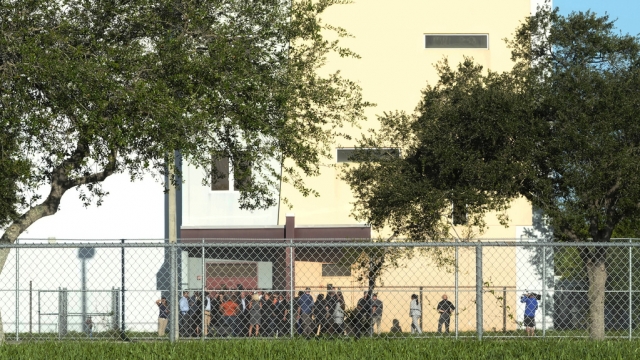Gunfire erupted again at Parkland’s Marjory Stoneman Douglas High School on Friday as part of a reenactment by ballistics experts of the 2018 massacre that left 14 students and three staff members dead.
The reenactment is part of a lawsuit by the victims’ families and the wounded that accuses the Broward County deputy assigned to the school of failing in his duty to protect them and their loved ones.
Reporters gathered outside heard shots just before noon. Earlier in the day, nine members of Congress toured the blood-stained and bullet-pocked halls.
Few have been inside the three-story building since the Valentine's Day 2018 shooting. The structure looms over the campus, locked behind a chain-link fence for use as evidence in last year's penalty trial for the shooter.
There is broken glass on the floor, along with wilted roses, deflated balloons and discarded gifts. Opened textbooks and laptop computers remain on students’ desks — at least those that weren’t toppled during the chaos.
In one classroom, there is an unfinished chess game one of the slain students had been playing, the pieces unmoved. The Associated Press was one of five media outlets allowed to tour the building after shooter Nikolas Cruz's jury went through.
SEE MORE: Judge in Parkland school shooting trial reprimanded for showing bias
The shooting, which sparked a nationwide movement for gun control, traumatized the South Florida community. Cruz, a 24-year-old former Stoneman Douglas student, pleaded guilty in 2021 and was sentenced to life in prison.
Not long after the lawmakers left the school, crews brought tables and ladders inside. Two helicopters hovered overhead. Cameras were placed outside and workers measured various distances from a mannequin head on top of a tripod and a door.
Ballistics experts were to fire up to 139 shots of live ammunition during the reenactment. The experts were firing from the same spots as Cruz, with an identical AR-15-style semiautomatic rifle, and the bullets were to be caught by a safety device. The reenactment was expected to take several hours.
Technicians outside the building were recording the sound of the gunfire, seeking to capture what deputy Scot Peterson, heard during the attack.
Peterson, who worked for the Broward County Sheriff’s Office and is named in the lawsuit, said he didn’t hear all the shots and could not pinpoint their origin because of echoes. He got within feet of the building’s door and drew his gun, but backed away and stood next to an adjoining building for 40 minutes, making radio calls. He has said he would have charged into the building if he had known the shooter’s location.
Families of the victims who filed the lawsuit contend Peterson knew Cruz’s location, but retreated out of cowardice and in violation of his duty to protect their loved ones.
Peterson, 60, was acquitted in June of felony child neglect and other criminal charges for failing to act, the first U.S. trial of a law enforcement officer for conduct during an on-campus shooting.
The burden of proof is lower in the civil lawsuit. Circuit Judge Carol-Lisa Phillips allowed the reenactment, but made clear she was not ruling on whether the recording will be played at trial. That will have to be argued later, she said. It is likely Peterson’s attorneys will oppose the attempt.
No trial date has been set. The families and wounded are seeking unspecified damages.
SEE MORE: Deputy acquitted for failing to act during Parkland school shooting
Earlier Friday, the U.S. House members spent an hour and 40 minutes walking the same path Cruz did during the six-minute attack, accompanied by victims' family members and prosecutors.
After the tour, the members — six Democrats and three Republicans on the House School Safety and Security Caucus — traveled to a nearby hotel to discuss school safety issues with parents and wives who lost loved ones in the attack. The roundtable meeting was being held in the same ballroom where the families learned of their loved ones' deaths.
Florida Democratic Rep. Jared Moskowitz, a Stoneman Douglas graduate whose district includes Parkland, said Congress owes it to the families who have lost children, parents and spouses in school shootings to make campuses safer. He said seeing the scene will allow the members to fully grasp what happened.
“You can read about it all day long, and debate it all day long, but it is not the same as walking through the school,” said Moskowitz, who organized the tour with Republican Rep. Mario Diaz-Balart of Miami. Moskowitz pointed out that Parkland, an upscale suburb of Fort Lauderdale, is considered Florida's safest city.
“It is now the home of the largest (high) school shooting in our history,” he said.
Parent Max Schachter, whose 14-year-old son Alex died in the shooting, suggested the tour and school safety roundtable to Moskowitz.
“We can come together and enact common-sense school safety solutions so this will never happen again,” said Schachter, a former insurance broker who is now a full-time campus safety advocate. “Safety has to come before education — you cannot teach dead kids.”
The building is scheduled to be demolished after the tour and shooting reenactment. The school is closed for the summer and no students or teachers were on campus Friday.
Trending stories at Scrippsnews.com



